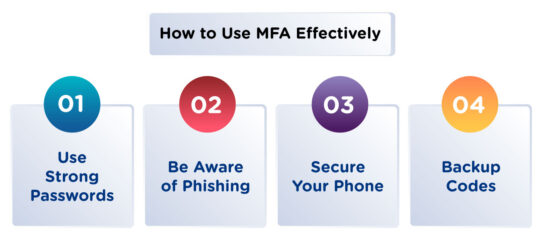As technology continues to advance, the need for robust security measures has become necessary. With constant news about data breaches and hacking attempts, protecting our online accounts has become a top priority. To help users secure their online accounts, many companies suggest the usage of Multi-Factor Authentication (MFA). In this blog, let us understand whether multifactor authentication is really a scam or not.
What is Multi-Factor Authentication?
Multi-factor authentication is a method that adds extra steps to protect your account. Instead of just using a password to log in, you need at least two things to get in. It is a security process where you need more than one method of verification to log into an account. These could be something you know (like your password), something you have (like your phone), or something you are (like your fingerprint). The idea is to add another layer of security to it.
For example, while login you enter the password first. Then, you might get a text message with a code that you also need to enter. This means that even if someone steals your password, they still can’t get into your account without that code.
According to a report, MFA can prevent more than 99.9% of attacks that try to take over accounts.
How Does MFA Work?
Multi-factor authentication combines the following factors:
- Something You Know: In most cases, this includes a password or a PIN.
- Something You Have: This could be a security token, a mobile phone, or a smart card.
- Something You Are: This includes your biometric authentication such as fingerprints, facial recognition, and voice recognition.
For example, after login, you might receive a code on your phone that you will need to enter to complete the login process.
Why Do People Use MFA?
The main reason people use multi-factor authentication is to improve security. The main reason people use MFA is to improve security. In case your password is stolen, they will need to complete second-factor authentication to access your account. It becomes hard for hackers to log in to your account.
Is MFA Foolproof?
The extra layer of security by MFA is not enough, as it has some potential issues:
- Phishing Attacks: Hackers can easily steal your second factor by conducting phishing attacks. For instance, In the third quarter of 2024, as per the report, 932,923 phishing attacks, an increase from 877,536 in the previous quarter.
- SIM Swapping: In case the hackers manage to take over your phone number, they may access your MFA codes.
- Inconvenience: Other users regard MFA as a pain in the neck due to additional steps involved when trying to log in.
Regardless of all these problems, MFA is still one of the most effective methods for safeguarding your online accounts.
Why Do Some People Think MFA is a Scam?
Some people believe multi-factor authentication is a scam because it can feel annoying. Here are a few reasons why:
- Extra Steps: Many find it frustrating to go through extra steps just to log in. It can take more time, especially when you are in a hurry.
- Technology Issues: At times, users cannot obtain the codes or authenticate their access to their account. When one loses their phone or fails to obtain a signal, then his or her account is locked out.
- False Sense of Security: Some people argue that MFA provides people with a false sense of security. They believe hackers can do anything if they have the will to commit this. They can bypass most obstacles.
- Not Foolproof: MFA may make your accounts safer, but nothing is 100% secure. There are ways hackers may bypass MFA; for instance, phishing attacks, in which they will try to trick you into giving them your codes.
The Truth About MFA
Of course, these are enough reasons to label multi-factor authentication a scam, but this is not fair because:
1. More Security
The main purpose of MFA is to increase security. In other words, passwords might be weak or stolen, however, the addition of another layer makes it much more difficult for someone to access your account. It is similar to a lock on your door, then adding a deadbolt. It is not foolproof, but it certainly makes it quite challenging for intruders.
2. Common Practice
Many legitimate companies and services protect their users with MFA. Banks, email providers, and social media platforms all offer this feature. If it were a scam, they would not be using it. They know security is important to the customers.
3. User Control
MFA gives users more control over their accounts. Even if someone else knows your password, if MFA is enabled for an account, they cannot break into it. This should be done for highly sensitive accounts, such as financial or personal information-related ones.
4. Keeps You Safe from Common Attacks
MFA prevents common threats of the theft of passwords and unlicensed entry. Even if hackers were able to break in somehow, MFA lowers the probability of an attack succeeding.
Is MFA a Scam?
No, it is not. It is a legitimate security measure used by many organizations to protect sensitive information. It is important to stay vigilant and use MFA as part of a broader security strategy.
How to Use MFA Effectively?
To use MFA effectively, follow these tips:
- Use Strong Passwords: Even with MFA, a strong password is essential. Avoid using common passwords and change them regularly.
- Be Aware of Phishing: Always be cautious of emails or messages asking for your login information. Before clicking any link, check for the source first.
- Secure Your Phone: Since many MFA methods rely on your phone, make sure it is secure. Use a strong passcode and enable biometric security if available.
- Backup Codes: Store the codes somewhere safe. There are some services that provide backup codes too.
Final Words!
Multi-factor authentication is absolutely not a scam. It is one of the most valuable tools in the fight against cybercrime. The method is not perfect, but it does enhance the security of your online accounts significantly. Understanding how MFA works and following best practices can protect you from many common threats. No security measure is foolproof, but using MFA is a smart step toward keeping your information safe.
To learn more about security, visit us at WisdomPlexus!
Recommended For You:





